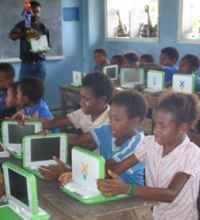I am Clayton R. Wright and this is my response to Michael Trucano's World Bank blog post: Laptops for education: $10, $35, $100 and points in between (but not above!), where Michael notes that:
Many ministries of education [previously expressed] their desires for introducing computers in schools by saying things like 'We want something that can enable students and teachers to do x and y and z'. More recently, this conversation has switched in many places, as increasing numbers of ministries (and especially their most senior officials) have initiated their related planning processes by saying that 'we need a computer that costs $___'.
I don't want to suggest that ideas in this response to Michael Trucano's blog post are new; but, if the answers are so well-known, why do the situations keep occurring? I agree with his comments regarding the implementation of computers, especially in developing countries. In particular:
- a shift from what we can get a computer to do, to obtaining one at the lowest price;
- the increased focus on buying computers rather than on the pedagogical uses of them;
- the lack of focus on the total cost of the effective implementation of computers;
- the current obsession on the retail prices of ICT devices; and
- the need to consider how ICT implementation can alter the cost structure of education.
For years, I have heard that the cost of a computer prevents teachers and learners in many countries from obtaining one. This is quite true. As he stated on his blog site "In Benin, the cost of a generic PC is equivalent to a teacher's salary for eight months." In countries such as Sierra Leone where a high school teacher may make $100 to $140 per month, obtaining a used Intel-based, Microsoft-compatible machine can cost $400 to $600. Thus, it can be extremely difficult for these teachers to own a computer let alone buy software and courseware.
They are more likely to own a mobile phone starting at $30 each - these are relatively inexpensive, easy to use, enable people to reach out to their families and communities, and the infrastructure to support them is present. Few of these attributes apply to the current state of computer implementation in many developing countries.
So why spend the money on computers instead of placing more teachers in classrooms (with the funds that would be spent on computers)?
Perhaps, I have part of the answer. In the Western world, many donors to educational institutions donate their funds to building new educational structures and facilities. It is something that they can see and touch. Often, their names are displayed on the buildings. The donors are able to have their photos taken in front of it. I think that it is likely that politicians and educators in developing countries also want to be associated with things that they can see and touch.
"What have you done with our money (or donated funds)?" says the public. The politicians reply, "See, this is what we did." New pedagogy and different teaching methods are not as photogenic as a shiny new building or object. When you take a photograph of an effective teacher and a photo of one that could improve his or her skills, can you tell the difference? Further, achieving changes to learning and teaching in the classroom takes time and can be difficult to measure. Buying new objects gives a more immediate and visible "bang for the buck". In addition, the possession of a computer signals one's arrival into the digital age. What should be prized is not possession, but using the technology to address/solve a problem.
Now that inexpensive computers are available, educators and politicians have one less excuse for why computers are not accessible to their educators and students. The hard work lies ahead - improving teaching and learning, providing professional development, obtaining/producing educational resources that align with the curriculum, dealing with cultural diversity, providing essential support and maintenance, and establishing quality assurance systems as well as criteria that can be used to judge the level of success.
We also need to influence decision-makers to ensure that equipment acquisition is not their sole focus and that they ensure that the equipment is used to support goals of the educational system, the nation, and the society.
It is frequently "old folk" who have no or limited experiences with technology who make the decisions that prevent children from using computers.
In one school in Malaysia, I came across 15 computers in brand new unopened boxes. The boxes had been sitting in a locked closet for months. They were not used because the teacher who ordered them requested the computers two years prior. After a year of waiting for the computers to arrive, he left the school. When the computers finally arrived, there wasn't a teacher at the school who had computer skills.
I suggested to the principal that some of the students (who I had been in the internet cafe down the street) could set up the computers and show teachers how to use them. The response was firm but polite, "Students don't teach teachers, after all they are just students". Also, if the computers were available to the students, they would steal them. Thus, the principal preferred to have the computers stay in unopened boxes in a locked room.
The local principal was only part of the challenge. The administrators in the school system bear some responsibility for the results as they took too long to order the equipment and when it arrived at the school, the associated software was out of date. (The delay was caused by bureaucracy and the desire to make a bulk purchase. Note that it should not be assumed that all schools in Malaysia experienced this delay in ordering equipment.) Further, the administrators didn't check to see if the computers were being used. When in use, computers need to be repaired, but no funds were provided for replacement parts or know-how.
Based on my experience in Africa, Southeast Asia, and South America, the scenario described above is repeated over and over. Whether funding for the technology is provided by a ministry of education or an external agency, the funding body should monitor the implementation and use of the technology over a period of time. Clear goals for the implementation are needed and should be monitored. From time to time, corrective action may need to be taken to ensure that the technology is being used effectively and funds for computer maintenance should be allocated when computers are purchased.
With guidance, students can learn to use a computer and learn more quickly with the help of knowledgeable educators. But, if necessary, students can learn on their own or with the help of their friends. Given equipment (that is maintained) and well-designed software (that is related to their lives and/or imagination), children can learn. Based on my work in countries, such as Botswana, I have noticed that teachers and administrators may get in the way of students learning how to use computers to gain new knowledge and skills. Dr. Sugata Mitra's Hole in the Wall Project has provided some proof that students can learn to use computers with limited guidance. Preferably, however, skilled teachers should be available to assist in the learning process.

Let's help them learn!
Since the effort to produce inexpensive computers is well underway, perhaps we can now turn our collective resources, expertise, intelligence, and will to addressing the other issues surrounding the effective implementation of computers in the developing world.
For example, we have already started to develop and distribute free educational or learning resources. A number of international organizations, such as the UNESCO Office in Bangkok and the Commonwealth of Learning in Vancouver, are providing professional development opportunities. They should be commended for their efforts. However, workshops offered by a number of well-meaning organizations tend to be of short duration and focus on Kirkpatrick's first and/or second level of evaluation (how participants have reacted to the training and what participants have learned from the training).
Few organizations measure whether what was learned is being applied to the job and whether the application of training achieves measurable results. Minimal effort seems to be placed on developing a multiplier effect in which the first groups of trained instructors are required to teach others in the country. Yes, the expectation may be there, but little support is given to help these instructors to conduct further training and their follow-up activities are not monitored. All training should engage the educators and not only help them to use computers to obtain information and increase productivity, but also to promote critical thinking and creativity.
More effort needs to be placed on determining how the implementation of technology can alter the cost structure of education. For example, for certain knowledge-related tasks, businesses have reduced travel costs and minimized the time an individual is away from his or her desk by using videoconferencing or interactive whiteboards accompanied by an audio channel. Thus, the impact on the companies' productivity is minimized while the employees obtain new knowledge, and perhaps, new skills. Funds allocated for travel can be used elsewhere in the organization, perhaps to develop interactive online lessons.
I am not advocating that developing countries use videoconferencing systems to replicate ineffective face-to-face instruction or use dedicated, high-bandwidth systems that will collect dust because they are too expensive to run. But I do wonder how technology can be used in developing countries to help educators re-allocate resources - what technology, under what conditions, to obtain what educational goal? For example, can computers or e-book readers eliminate the purchase of books?
No doubt, supplying funds to provide clean water, improve sanitary conditions, provide mosquito nets, and enable land to support the growth of foodstuffs would help many. But, must we wait for everyone to have proper outdoor toilets before all can have indoor toilets or for everyone to have a bicycle before anyone can have a car? The same question applies to the implementation of computers.
Clayton R. Wright is a frequent contributor to the Educational Technology Debate
For additional information on this topic, refer to: Recurring Issues Encountered by Distance Educators in Developing and Emerging Nations in The International Review of Research in Open and Distance Learning, Vol 10, No 1 (2009), ISSN: 1492-3831




"But, if necessary, students can learn on their own or with the help of their friends."
Exactly. What is going to happen in a few years is educational computers will become so inexpensive that a significant portion of the population in developing countries will start purchasing them on their own. (In fact, it wouldn't surprise me if we are already seeing educational software on cell phones.)
Parents will do this because they are unhappy with the schools, and because they know their children will enjoy educational computing and so put in a lot of time learning.
This development will in turn pressure the schools to get going with educational computing.
Clayton, what do you think of my set of predictions?
We are already seeing educational activities on mobile phones - in fact, we have a month's worth of a Educational Technology Debate on it already.
Eduardo, your set of predictions may be an excellent view of the future. However, all I know for sure is that the cost of hardware will decline, parents will continue to want the best for their children (some will encourage their progeny to go to school while others will direct them to the world of work at an early age), and youth, with or without adult support/supervision, will be intrigued with the use of computers.
Yes, as the price for hardware decreases, I expect that some parents in the developing/emerging world will purchase computers on their own. If they have funds left over after paying for water, food, shelter, and basic school fees, then a computer may be considered as an enlightened purchase. I am hoping that small tablet-based computers will be the preferred purchase as they are better sealed from moisture and sand/dirt and have larger screens than regular mobile phones. However, it is not the hardware that should be of concern, but rather the availability of free or inexpensive interactive educational software that will run on these smaller devices. Although I hear a great deal about e-book readers changing the educational landscape in developing countries, I think that it will be the availability of small, low-powered, rugged digital devices and the availability of free/inexpensive/subsidized interactive and engaging learning materials that will be the ultimate game changers.
Eduardo, perhaps the following upcoming conferences will shed more light on your predictions.
October 19-22, 2010 World Conference on Mobile and Contextual Learning (mLearn 2010), 9th, Valletta, Malta. www.mlearn2010.org
November 10-11, 2010 Mobile Communication Technology for Development (M4D), 2nd annual, Kampala, Uganda. http://m4d.humanit.org/
If you are interested in the future of education in the developed world, consider viewing the 60-minute presentation, Into Tomorrow: Looking at the Extreme Future (http://www.istevision.org/viewsession.php?id=120) by Lee Crockett and Ian Jukes. This International Society for Technology in Education conference session focused on four main themes:
- We live in exponential times.
- Disruptive change is upon us and affects every aspect of our lives.
- We must comprehend and accept change rather than hang on to the past.
- Our educational system must change as it is reaching a tipping point and not meeting the needs of students who will live in a world much different than the one we are use to.
Clayton
Just one comment on Trucano's blog about an unhealthy focus on the price of the technology. I agree with all that he says, especially his concluding remarks, but the ICT industry is partly at fault for this focus.
It is because we insist on running ICT projects.
When have you seen the headline "New literacy improvement project" followed by (oh, by the way, we are using OLPC)or "School attendance project" (and we are using PCs as the tool)
I recall the launch of OLPC with the catch phrase "It is an Education Project", but I have never seen a follow on announcement that started with the educational benefit.
Ian